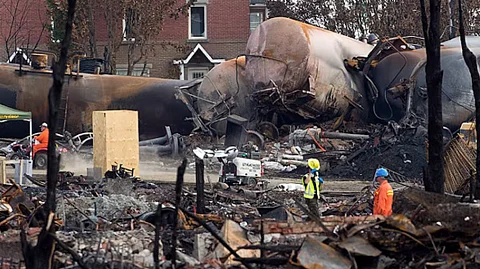

Canadian Pacific Railway has been ruled not liable for the 2013 Lac-Mégantic train disaster, the worst rail accident in modern Canadian history.
The Québec Court of Appeal dismissed claims that the company bore responsibility for the tragedy, which killed 47 people.
“The onus is on the appellants to show if Canadian Pacific had acted as they suggest, the course of events would have been different,” the Court ruled. “They failed.”
Canadian Pacific had loaded and inspected the tank cars involved in the derailment but did not own the train or its cargo.
The Government of Québec and six insurers had sued the company to contribute to a $430 million compensation fund, arguing it should have conducted a risk assessment. The court found that the Railway Safety Act did not require Canadian Pacific to verify whether its connecting carrier, Montréal, Maine & Atlantic, would transport the cargo safely.
The Transportation Safety Board blamed the disaster on Montréal, Maine & Atlantic and its crew, citing a “weak safety culture.”
Investigators determined the train was improperly secured overnight near Nantes, Que., allowing it to roll downhill into Lac-Mégantic, reaching speeds of 105 km/h before derailing and igniting an inferno that destroyed 40 buildings.
Many victims were killed as they slept.
“The appellants argue if Canadian Pacific had conducted a risk assessment of the transportation of crude oil, it would not have entrusted the cargo to Montréal, Maine & Atlantic,” wrote the court.
“This second proposition is based on the premise that, once made aware of Montréal, Maine & Atlantic’s operational practices, Canadian Pacific would have instructed them not to park a train on a slope overnight.”
The disaster led to the bankruptcy of Montréal, Maine & Atlantic. The lone engineer was acquitted of criminal charges.
In the aftermath, numerous safety reforms were introduced, including a ban on single-person crews handling hazardous materials, the elimination of puncture-prone tank cars, and increased insurance requirements for railways transporting oil.
At the time of the disaster, Montréal, Maine & Atlantic had only $25 million in liability coverage, the legal minimum. Parliament later raised the required coverage to at least $125 million.
“Broadly speaking, safety in the rail industry has improved over time,” Transport Canada stated in its 2023 Review Of Rail Safety Oversight Activities, noting that “reportable accidents have been trending downwards.”
